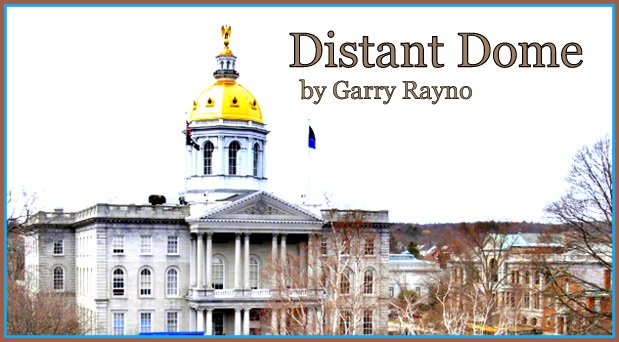Distant Dome is co-published by InDepthNH.org and Manchester Ink Link
By GARRY RAYNO, Distant Dome
The midterm elections are upon us, and there is much at stake for both sides of the aisle in New Hampshire and Washington.
 As the days click away heading to election day, you can expect to hear and see a lot about taxes in the races for state government offices from governor to representative.
As the days click away heading to election day, you can expect to hear and see a lot about taxes in the races for state government offices from governor to representative.
While taxes are perceived as a negative — particularly against Democrats running for office — they are essential to government of any kind: local, county, state or federal.
Without taxes there is no government. While Libertarians and Free-Staters might like that, most people would not.
Without taxes there would be no highways or other transportation systems, no money for environmental protection, economic development, education, conservation, or food and support for the poor, elderly, children, disabled and ill.
Outside of the gasoline tax, which was long overdue for a hike, and the cigarette tax, the New Hampshire legislature has been reluctant to raise any taxes for some time now.
The last major round of tax increases came when lawmakers grappled with how to fund education two decades ago.

Garry Rayno
The system they eventually developed included increases in a both business taxes, the cigarette, rooms and meals, and real estate transfer taxes, as well as a new statewide property and utility taxes along with lottery revenues, tobacco settlement money and some general fund money.
Originally, the fund generated a little less than $1 billion in revenue but is now down to a little more than $800 million annually.
Before education funding increases, there was the late 80s, early 90s recession when lawmakers raised a number of existing taxes, and rearranged some others so they would produce more revenues after the bottom fell out in 1989 and 1990.
What really helped the state balance its books those lean years was the Medicaid Enhancement Tax, also known as Mediscam which produced about $2 billion in new revenue over a couple of budget cycles to bail out state finances.
Since 2010 the mantra around the State House has been “no new taxes or fees.”
The mantra has been effective as lawmakers are resistant to raising taxes and instead have reduced the rate of business taxes, and tried to reduce the rates of other levies but not with the same success.
“No new taxes” accomplishes two things, it freezes or shrinks the size of state government and makes different programs whose costs are going up each year due to inflation compete for the few discretionary dollars available in the budget.
Some lawmakers like that idea so more immediate needs are addressed such as the opioid crisis while lower priorities are not.
However, the end result can be a long wait list for developmentally disabled services, higher tuition for students in the state community college and university systems and an education funding system forcing many school districts to the brink of crisis.
The state’s tax system has always been inelastic, which means it does not adapt to changes in the economy.
Another way to describe it would be to say it is held together with string, bailing wire and a little Scotch tape.
One of the reasons the tax system is so fragile is it lacks broad-based taxes that fall on everyone.
Yet broad-based taxes are the third rail of New Hampshire politics and have been since the glory days of William Loeb’s Union Leader and Gov. Meldrim Thomson.
They so poisoned the political well there cannot be a reasonable discussion about reforming the tax system to make it more equitable for everyone.
There are creative ways to reform the system including local property taxes without raising more revenue but they involve broad-based taxes of one kind or another.
During the debate on education funding, Gov. Jeanne Shaheen, running for her third term, decided she could no longer take the pledge against broad-based taxes.
Her administration floated a general sales tax, but when the numbers were crunched it became obvious a low-rate sales tax would not raise enough revenue because of all the “limited sales taxes” the state already collects such as liquor revenue, and taxes on rooms and meals, cigarettes, beer, etc.
Many European countries use value added taxes and eliminated income taxes.
New Hampshire has a value added tax, the business enterprise tax, which taxes a business’s compensation, dividends and interest.
The tax was originally instituted to blunt a lawsuit filed by Cabletron executives claiming the business profits tax was unconstitutional because it was not “reasonable and proportional” when only a small number of the state’s businesses paid it.
The business enterprise tax was intended to tax the lawyers, doctors, architects and other professional organizations and businesses that claimed they had no profits only compensation to employees and officers.
It has performed as expected, but the rate has been reduced from .75 percent to .675 percent and will go down to .5 percent by the 2021 fiscal year.
The GOP had made reducing business taxes a priority during the past few legislative sessions saying the rate cuts are needed to compete with surrounding states.
Former Gov. Maggie Hassan described the rate cuts as blowing an $80 million hole in future budgets. That has not materialized but neither has the promised influx of businesses from other states.
That is immaterial just before the general election when the GOP machine turns up the heat on taxes against Democrats from the governor’s race to representative contests.
President Trump uses the same tactic.
Locally, the tax issue has become the GOP’s sacred sword to plunge into the hearts of Democrats.
The state party has been putting out daily press releases highlighting tax or fee increases they claim Democratic gubernatorial candidate Molly Kelly supports.
It is a long-standing GOP strategy and will continue to be until Democrats create a good rebuttal to put the issue to rest, which they have been unable to do to date.
There has been little talk on either side of raising taxes and there is no reason politically to go there with state revenues running tens of millions of dollars ahead of projections creating about a $130 million revenue surplus at the end of the 2018 fiscal year.
One-quarter into the 2019 fiscal year, state revenues are $45 million ahead of projections.
With millions more in revenue than anticipated, taxes should not be a political issue but it is.
There are many other issues that should define the differences between the two parties, but they are being lost in all the noise over taxes.
There are tax issues to debate such as how to fix the broken education funding system or who should pay for the current use program, but that is not the focus of the television and radio ads, campaign mailers and social media posts from the GOP.
In this day and age, New Hampshire needs to have a reasonable discussion about its tax system and ways to make it more equitable for everyone, but you cannot do that in an election year.
And we’re not.
Garry Rayno may be reached at garry.rayno@yahoo.com





